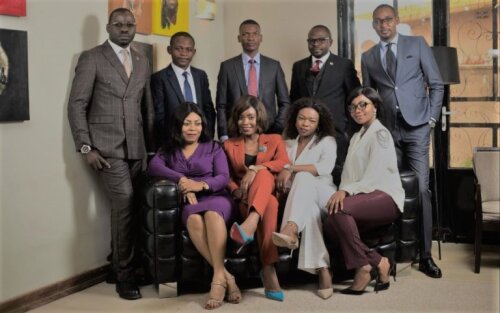Best Mining Law Lawyers in Lubumbashi
Share your needs with us, get contacted by law firms.
Free. Takes 2 min.
List of the best lawyers in Lubumbashi, DR Congo
About Mining Law in Lubumbashi, DR Congo
Lubumbashi, located in the Katanga region of the Democratic Republic of Congo (DR Congo), is widely recognized as a mining hub due to its rich mineral resources, especially copper and cobalt. Mining law in Lubumbashi is governed predominantly by national legislation, including the Mining Code and its regulations, but local authorities also contribute to the application and oversight of mining-related activities. These laws set the framework for acquiring mining rights, environmental protection, land use, and the responsibilities and rights of mining companies, the government, and local communities. Understanding mining law is essential for anyone involved in the acquisition, operation, management, or investment in the mining sector in this region.
Why You May Need a Lawyer
Navigating mining law in Lubumbashi is complex, given the overlapping layers of national and local regulations, the technical nature of mining operations, and the significant economic interests at stake. Here are some common situations where you may benefit from legal assistance:
- Applying for mining permits and licenses
- Negotiating mining partnerships, joint ventures, or investment agreements
- Handling disputes with local communities or government entities
- Ensuring compliance with environmental and safety regulations
- Advising on taxation, royalties, and other financial obligations
- Managing land use and resolving land right conflicts
- Dealing with regulatory inspections, audits, or sanctions
- Protecting intellectual property related to mining processes and technologies
- Handling acquisitions, mergers, or the transfer of mining rights
- Representing your interests in administrative hearings or court proceedings
A lawyer with expertise in DR Congo mining law can help safeguard your interests, ensure compliance, and prevent costly mistakes.
Local Laws Overview
Mining activities in Lubumbashi are primarily regulated by the following legal instruments:
- Mining Code (Code Minier): The main piece of legislation, setting out how mining titles are acquired, transferred, and lost, as well as obligations of operators.
- Mining Regulations: Detailed rules supplementing the Mining Code, clarifying administrative procedures, technical requirements, and operational standards.
- Environmental Laws: Operators must conduct Environmental Impact Studies and comply with measures to mitigate environmental risks.
- Labor Laws: These govern the employment of local and foreign workers and require compliance with health and safety standards.
- Taxation and Royalty Provisions: Mining companies must pay mining royalties, taxes, and various fees, calculated on the value of extracted minerals.
- Community Rights and Local Development: The law requires mining companies to contribute to local community development and respect traditional land rights.
- Transparency Requirements: DR Congo is part of international initiatives like the Extractive Industries Transparency Initiative (EITI), requiring regular disclosure of payments and contracts.
Understanding and complying with these local laws is crucial for anyone planning to engage in mining activities in Lubumbashi.
Frequently Asked Questions
What permits are required to start a mining operation in Lubumbashi?
You need to obtain either a research permit or an exploitation permit from the Ministry of Mines. Exploration activities require a specific permit, while mining operations need an exploitation license.
Can foreign companies or individuals hold mining rights in Lubumbashi?
Yes, foreign investors can hold mining rights, but they must comply with DR Congo's investment laws and may be required to partner with local entities or abide by additional regulations.
How long does it take to get a mining license?
The timeline varies depending on the type of permit and the completeness of your application. It can take several months due to required studies, public consultations, and administrative processing.
What are my obligations regarding the environment?
You must conduct an Environmental Impact Study and implement measures to limit environmental damage. Ongoing monitoring and reporting to authorities are required.
What taxes and royalties must miners pay?
Mining companies in DR Congo are subject to royalties, surface rights fees, corporate taxes, and other statutory charges based on production and exports.
Do I need to compensate local communities?
Yes, the law requires mining operators to negotiate with affected communities and contribute to local development projects. Compensation may also be required for land use or damages caused by mining.
What happens if I do not comply with mining regulations?
Non-compliance can lead to administrative sanctions, fines, suspension or withdrawal of permits, and possible civil or criminal proceedings depending on the violation.
Are mining rights transferable?
Mining rights can generally be transferred, subject to government approval and compliance with the procedure set by the Mining Code and Regulations.
How are disputes in the mining sector resolved?
Disputes may be resolved through negotiation, mediation, or litigation before local courts. Some agreements may provide for arbitration, especially in contracts involving foreign investors.
What is the role of the Mining Cadastre?
The Mining Cadastre is responsible for the registration, management, and oversight of mining titles. It processes applications, maintains records, and ensures compliance with applicable laws.
Additional Resources
If you are seeking more information or support in mining law in Lubumbashi, consider contacting or consulting the following:
- Ministry of Mines (Ministère des Mines): The main governmental body responsible for mining regulation and oversight.
- Mining Cadastre (Cadastre Minier): Handles applications and registrations for mining permits and rights.
- Chamber of Mines (Chambre des Mines): Part of the Federation of Enterprises of Congo, representing the mining industry.
- Environmental Protection Agency (Agence Congolaise de l'Environnement): For guidance on environmental compliance.
- Local Bar Association (Barreau de Lubumbashi): For authorized legal professionals specializing in mining law.
- Extractive Industries Transparency Initiative (EITI): For information on transparency standards and publications.
Next Steps
If you require legal assistance regarding mining law in Lubumbashi, DR Congo, follow these steps:
- Gather all relevant documents, such as contracts, permits, correspondence, and corporate records related to your mining activities.
- Identify your specific legal issues: permitting, compliance, community relations, disputes, or others.
- Contact a qualified lawyer who specializes in mining law and is familiar with local procedures and practices.
- Request an initial consultation to discuss your needs and obtain preliminary advice.
- Follow your lawyer’s guidance on regulatory filings, negotiations, or dispute resolution for the best possible outcome.
Working with experienced legal counsel ensures you can confidently navigate Lubumbashi’s mining law framework and protect your investments and interests.
Lawzana helps you find the best lawyers and law firms in Lubumbashi through a curated and pre-screened list of qualified legal professionals. Our platform offers rankings and detailed profiles of attorneys and law firms, allowing you to compare based on practice areas, including Mining Law, experience, and client feedback.
Each profile includes a description of the firm's areas of practice, client reviews, team members and partners, year of establishment, spoken languages, office locations, contact information, social media presence, and any published articles or resources. Most firms on our platform speak English and are experienced in both local and international legal matters.
Get a quote from top-rated law firms in Lubumbashi, DR Congo — quickly, securely, and without unnecessary hassle.
Disclaimer:
The information provided on this page is for general informational purposes only and does not constitute legal advice. While we strive to ensure the accuracy and relevance of the content, legal information may change over time, and interpretations of the law can vary. You should always consult with a qualified legal professional for advice specific to your situation.
We disclaim all liability for actions taken or not taken based on the content of this page. If you believe any information is incorrect or outdated, please contact us, and we will review and update it where appropriate.











